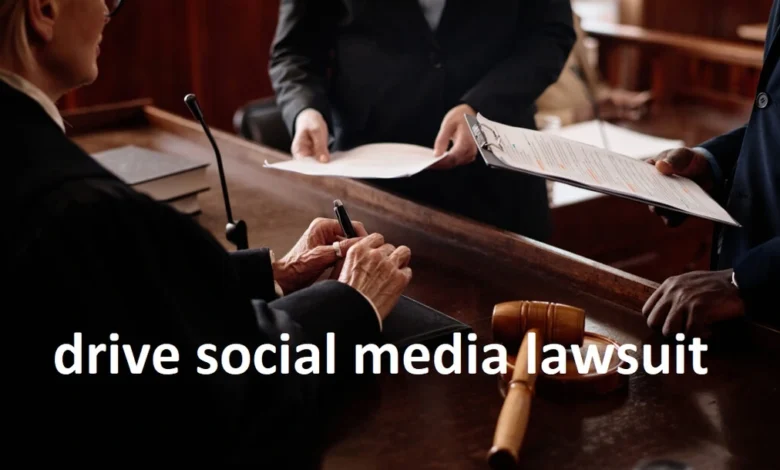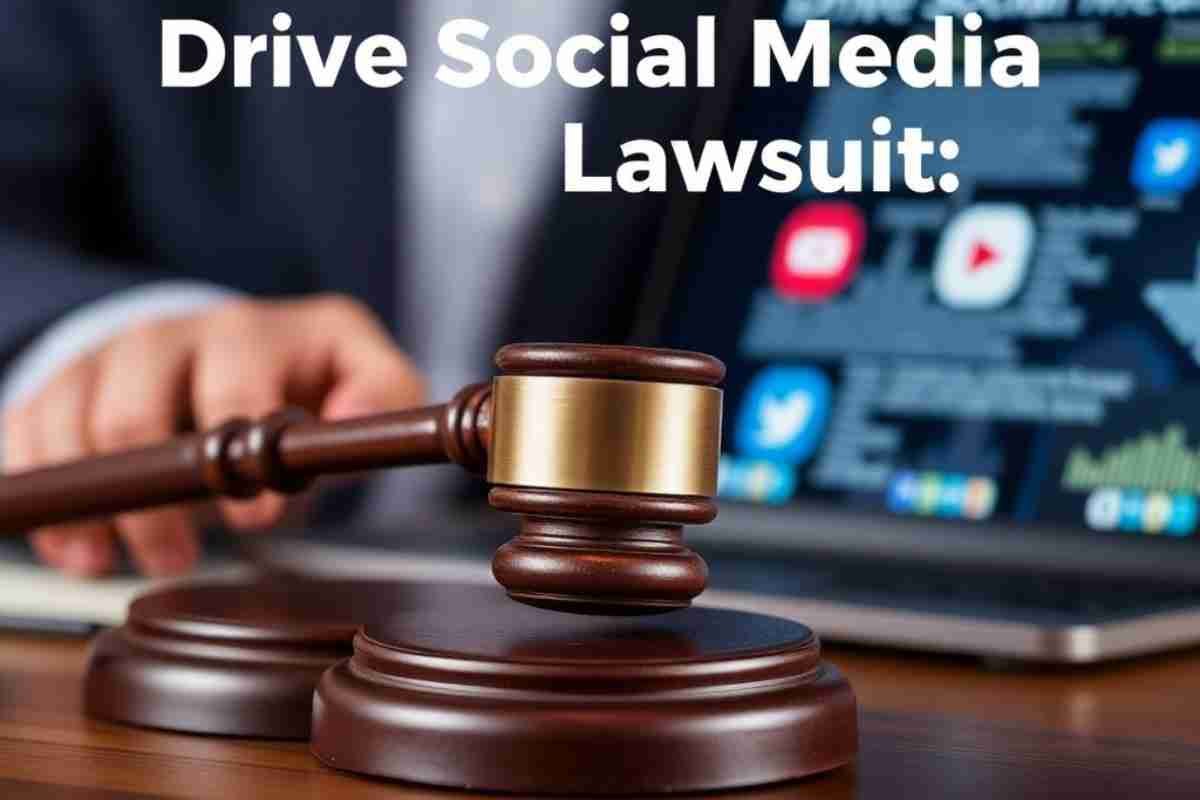Drive Social Media Lawsuit: Unpacking the Legal Battle and Its Implications

Social media marketing has become one of the most powerful tools for businesses to expand their reach, build brand identity, and connect with consumers. However, not all companies operating in this space have upheld ethical or legal standards. The Drive Social Media lawsuit has become a hot topic, raising serious questions about business practices in digital marketing. This article explores the background of the lawsuit, the allegations made, the possible legal implications, and what businesses can learn from this case.
Understanding Drive Social Media Lawsuit: A Brief Overview
Drive Social Media Lawsuit is a digital marketing agency that specializes in helping businesses grow through social media advertising, brand engagement, and data-driven strategies. With offices in multiple locations, including St. Louis and Nashville, the company has positioned itself as a leader in the industry.
Known for its aggressive marketing approach, Drive Social Media Lawsuit claims to leverage advanced data analytics and artificial intelligence to optimize ad spend and improve customer conversions. Their strategies have helped various businesses boost their digital presence. However, as with any fast-growing company, scrutiny has followed.
Despite its claims of success, Drive Social Media Lawsuit has faced allegations that have led to legal trouble. Customers and former clients have raised concerns about the company’s practices, leading to lawsuits that put its business ethics under the microscope.
The Drive Social Media Lawsuit: What Happened?

The lawsuit against Drive Social Media Lawsuit revolves around multiple complaints, including breach of contract, deceptive business practices, and false advertising claims. The legal battle has shed light on questionable tactics that some companies may use to lure businesses into long-term contracts with little room for accountability.
Allegations Against Drive Social Media Lawsuit
- Misleading Marketing Claims
Several plaintiffs in the lawsuit allege that Drive Social Media made unrealistic promises regarding ad performance and customer engagement. Businesses that signed up for services were led to believe they would see immediate and significant returns on their investments. However, some claim that these expectations were not met, and the company failed to deliver results as advertised. - Long-Term Contracts With No Exit Strategy
Some businesses that partnered with Drive Social Media Lawsuit found themselves locked into long-term contracts that were difficult, if not impossible, to terminate without significant financial penalties. Plaintiffs argue that they were misled into believing they could cancel services if they were unsatisfied, only to discover that the contracts were legally binding with strict exit clauses. - Unclear Pricing and Hidden Fees
Another major concern raised in the lawsuit is the alleged lack of transparency in pricing. Clients claim they were not made fully aware of additional costs associated with campaigns, leading to unexpected charges. This has resulted in businesses spending far more than they initially budgeted for marketing efforts. - Failure to Provide Promised Services
Several complaints indicate that Drive Social Media Lawsuit failed to provide the level of service that was initially promised. Businesses that signed up for high-quality content creation, detailed analytics, and customer engagement strategies claim they received generic, cookie-cutter solutions rather than customized marketing plans tailored to their specific needs.
Legal Implications of the Drive Social Media Lawsuit
This lawsuit has serious legal ramifications, not just for Drive Social Media Lawsuit but for the digital marketing industry as a whole. If the allegations hold up in court, they could lead to increased regulatory scrutiny on marketing agencies and their business practices.
Potential Consequences for Drive Social Media Lawsuit
- Financial Penalties
If the lawsuit is ruled in favor of the plaintiffs, Drive Social Media Lawsuit may be required to compensate affected businesses for damages, refunds, and penalties. This could significantly impact the company’s financial health and reputation. - Reputational Damage
Legal battles can be damaging to a company’s credibility, and Drive Social Media Lawsuit is no exception. Even if the lawsuit does not result in a major financial loss, the negative publicity surrounding the case could lead to a loss of clients and business opportunities. - Changes in Business Practices
To avoid further legal trouble, Drive Social Media Lawsuit may need to revamp its contracts, pricing structures, and marketing strategies. Transparency in client communication, clearer contract terms, and ethical advertising may become necessary changes to rebuild trust.
Impact on the Digital Marketing Industry
- Stronger Regulations on Advertising Promises
Cases like this may push regulatory bodies to enforce stricter guidelines on digital marketing agencies, ensuring that companies cannot make exaggerated or misleading claims about their services. - Greater Transparency in Contracts
The lawsuit highlights the importance of clear, fair contract terms in the marketing industry. Businesses may demand more flexible agreements and transparency about cancellation policies before signing contracts with digital agencies. - A Shift Toward Performance-Based Pricing
Some industry experts believe that lawsuits like this will encourage a shift toward performance-based marketing contracts, where agencies are only compensated for tangible results rather than speculative promises.
Lessons for Businesses: How to Avoid Marketing Scams
While Drive Social Media Lawsuit lawsuit may serve as a cautionary tale, businesses can take proactive steps to protect themselves from similar situations when hiring marketing agencies.
1. Do Thorough Research
Before signing a contract with any digital marketing agency, conduct background checks, read client reviews, and ask for case studies or references. A reputable company will have a track record of successful campaigns with verifiable results.
2. Get Everything in Writing
Ensure that all agreements, promises, and service expectations are documented in a legally binding contract. This includes:
- The scope of work
- Expected deliverables and timelines
- Pricing and any additional fees
- Cancellation and refund policies
3. Avoid Long-Term Contracts Without a Trial Period
Marketing agencies that require long-term commitments upfront should raise red flags. Instead, opt for agencies that offer a trial period or monthly contracts, allowing you to test their services before making a large investment.
4. Ask for Clear Performance Metrics
Before investing in digital marketing, demand clear Key Performance Indicators (KPIs) that will measure success. Reliable agencies will provide data-driven results rather than vague promises of increased engagement.
5. Watch Out for Hidden Fees
Some agencies may have hidden charges that can quickly add up. Ensure you have a transparent pricing breakdown before committing to any service.
Conclusion: What’s Next for Drive Social Media Lawsuit?
The lawsuit against Drive Social Media Lawsuit highlights critical concerns about business ethics in digital marketing. Whether the company is found guilty of deceptive practices or not, this case is a wake-up call for businesses to be more cautious when choosing marketing partners.
If Drive Social Media Lawsuit wants to recover from this controversy, it will need to regain public trust by enhancing transparency, improving client relations, and making changes to its contractual agreements. Meanwhile, companies looking to invest in digital marketing must stay vigilant, informed, and proactive to avoid falling into similar legal disputes.
The world of social media marketing is highly competitive and constantly evolving. Lawsuits like this one are likely to shape how agencies operate in the future, pushing the industry toward greater accountability and ethical business practices.
